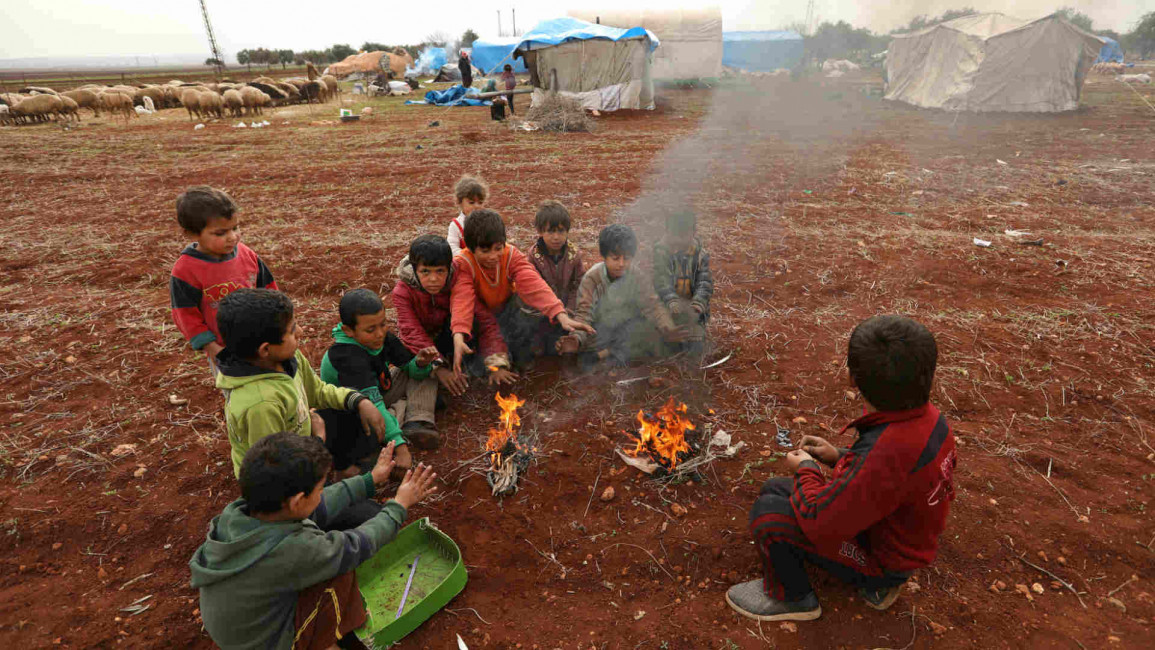Surge of Syrian families displaced in tough winter conditions as fighting intensifies
Tens of thousands of these displaced families are spending the freezing winter in makeshift shelters and overcrowded tents, according to statements made by Médecins Sans Frontières (MSF) on Wednesday.
Fighting has dramatically escalated since mid-December, especially concentrated in areas of northeast Hama, southern Aleppo and southern Idlib governorates, according to the organisation.
The increased violence has forced tens of thousands of families to flee north toward the Turkish border, where they are currently camping out despite the sub-zero conditions.
There have also been reports of families dying of cold while attempting to flee Syria during a snowstorm near the Lebanese border, with the death toll now rising to 17.
Abu Mustafa, a 37-year-old father of six, arrived in Sarmada, a town near the Turkish border, with next to nothing. Alongside twenty other families, he contributed what money they had to rent a small piece of farmland for roughly $1,000 per month.
"We had no other option. We needed somewhere to sleep. The cold seeps through everywhere," he said.
Conditions in the makeshift camps are severely inadequate with families fashioning shelters out of iron pillars covered in blankets or plastic bags, with no protection from the icy ground.
MSF reports there are around 160 makeshift settlements in the area, many of them who left with no belongings and little money, after seven long years of conflict.
The improvised tents fit three or four families, each with an average of six members, according to the health organisation.
Twitter Post
|
Access to basic facilities such as water, sanitation, food and medicines is also severely limited in the settlements, and winter weather threatens to further worsen the camp conditions, with MSF warning that many humanitarian groups are currently scaling back their efforts inside Syria.
Dr Mohammed Yaakoup, an MSF mobile medical team member, recently visited Al-Rahman camp near to Turkish border. Forty-four newly displaced families had recently arrived in the camp, where 70 families were already living. The ballooning population is significantly straining the limited camp facilities.
"The medical situation is really difficult. Respiratory tract infections are very common. Some families have been travelling for one week before arriving here, camping by the side of the road, in the open air," said Dr Mohammed Yaakoup, an MSF mobile medical team member in the rapidly-expanding Al-Rahman camp, currently home to over 100 families.
"Many patients with chronic disease haven’t taken their medication for a month. We had numerous cases of patients with diabetes and high blood pressure. Children had not been vaccinated for years," he added.
The doctor is providing some 45 consultations per day and a midwife in the team is giving around 15, according to MSF.
"One of the settlements that we visited was attacked several days later. People were forced to move again," said Zuhair Kanjou, MSF project manager for North Syria.
"The shelters where they live are not suitable for people. They flood with rain and are full of mud. The situation is miserable," he said.
MSF teams are distributing necessities such as blankets and insulating sleeping mattresses to thousands of families in need. The organisation states its intention to expand its vaccination programme in the coming weeks and coordinate with other organisations to continue distirbuting resources to those most in need.



